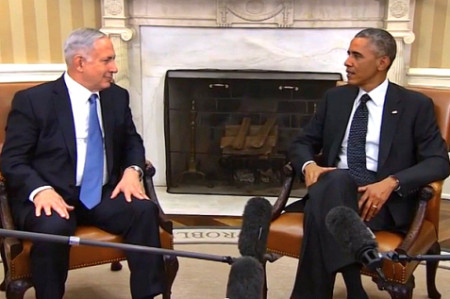Thursday’s meeting between Israeli Prime Minister Benjamin Netanyahu and President Obama has been overtaken by tension between Israel and the US over plans for another 2,610 homes for Jewish residents in Palestinian areas in East Jerusalem.
Just after the two leaders met at the White House, State Department spokeswoman Jen Psaki defended American criticism of the initiative, rebutting Israeli claims that it was ill-informed.
Psaki said the US was well aware of the situation in the neighborhood of Givat Hamatos, as sources in Jerusalem had provided Washington with clear information about the approved construction plans.
The spokesman rejected assertions that the State Department acted inapproriately during Netanyahu’s visit, saying that the comments were responsive to a “situation on the ground”.
However, Psaki also appeared to distance Washington from its warnings on Wednesday that the new homes will “distance [Israel’s] closest allies”. Asked if the US will act beyond rhetoric, Psaki answered only that “Israel remains a friend and ally”.
Supporters of the Givat Hamatos plan say last week’s approval was merely a technical step in a process that was begun nearly two years ago.
At the White House, Netanyahu pressed his line that negotiations between Iran and the 5+1 Powers (US, Britain, France, Germany, China, and Russia) must not grant Tehran’s demand for a significant program for uranium enrichment. He told Obama:
Iran seeks a deal that would lift the tough sanctions that you worked so hard to put in place and leave it as a threshold nuclear power. I firmly hope under your leadership that would not happen.
Obama appeared to shift the presentation to the press, speaking about this summer’s 50-day war between Israel and Gaza: “We have to find ways to change the status quo so that both Israeli citizens are safe in their own homes and school children in their schools from the possibility of rocket fire, but also that we don’t have the tragedy of Palestinian children being killed as well.”
Neither man offered a substantial statement about the Israeli-Palestinian peace talks, suspended by Netanyahu in late April after the Palestinian parties Fatah and Hamas agreed a unity government.
The Israeli Prime Minister repeated his maneuver, presented in his UN speech on Monday, to bypass the Palestinians and appeal to Arab States to advance peace in the region. He offered no specifics about what this would entail.

